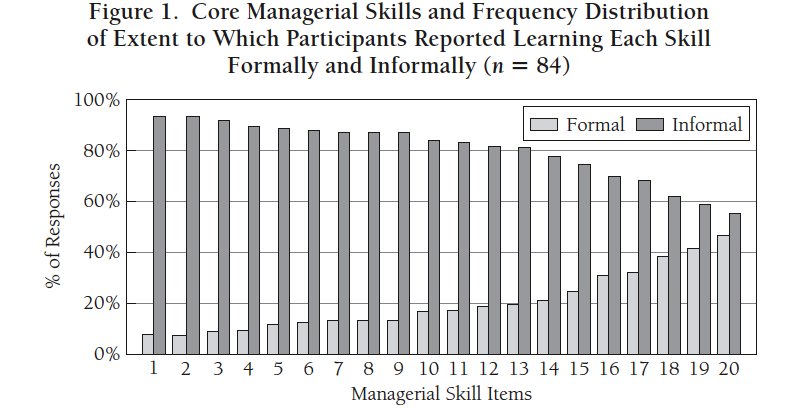In his blog, Jay Cross points to relative old, but interesting article on informal learning: Informal Learning and the Transfer of Learning: How Managers Develop Proficiency and notes, "If you're still relying on formal training to develop managers, you might want to give this one a read."
The paper is more interesting for what it omits, rather than what it purpose seems to be. That is, it seems to tout the importance of informal learning, rather than from what I see is the real key finding — its the mix that matters. For example, it makes several comments along these lines:
"Because skills learned informally are likely to share similar features with transfer tasks in terms of context and content, the potential exists for skills learned informally to be more readily transferred than skills learned in formal training contexts."
"Our study suggested that managers learn mostly from informal learning, that proficiency is the product of informal learning, and that metacognitive knowledge and self-regulation skills moderate informal learning and the transfer process.
In the paper they show the following chart (p377):

When referring to the chart they note, "The distribution indicates that managers reported learning all twenty skills predominantly from informal learning activities." Yes, while the managers believed they learnt more from informal learning, the chart actually seems to be showing that they learn a core base from formal instruction, and then they build from their proficiency from there. In addition, some core skills only need a drop of formal learning to get the process going, while others require a heavy dose.
This goes back to the previous post in which I noted that some learning episodes that are strictly informal may be too narrowly based in that the learner only learns part of a task or superficial skills that may not be transferable to the job (Bell and Dale 1999).
Thus, just as we have a "blend" of learning media and processes, we also need the proper mix of formal and informal learning. This means you not only have to select the proper blend of formal learning, but also select the proper mix of formal and informal learning. In turn, you then have to select the best blend of informal learning that will help the learners transfer their skills to the job.
In the paper they mention a study in which pilots with more flight experience perform better on a simulated flight test (that is, a transfer task) than did their novice counterparts. Now I don't believe that anyone is going to argue this point, but the other part to it is that those better performing pilots would have never been able to perform in the first place if it was not for their core skills gained with formal learning.
In the comment section on my previous post Michael Hanley notes, "...the reality is that all of these exist on a 'learning continuum.'" This learning continuum is also the subject of a post by Clark Quinn: The Formal/Informal Continuum.
Thus, its not a matter of designing learning from one side of the continuum or the other because you need the core skills from one side and the proficiency of actually being able to put those skills into practice from the other side. In addition you need that mix from the middle that is not readily identifiable as either formal or informal.
4 comments:
Your article resonates with my life experience. One just cannot throw a group of people with a high degree of job-specific formal education with another group having little or no such knowledge and expect the latter group to become at par with the former group just through chit chatting (even over several years) with the former.
I think you're reading too much into my two-sentence introduction to the article. At heart, we agree. I am all in favor of a balance of formal and informal. It's just that sometimes achieving that balance requires emphasizing the informal because it has often been neglected in the past. I should have been more clear, saying if "you're relying exclusively on formal learning...," for that was what I meant.
Hi Jay,
I'm sorry for not being more clear with the post but is was meant to be aimed more at the research paper rather than you. For example, in their Conclusion the authors write "In the light of these findings, companies should harness and leverage informal learning and cultivate the metacognitive abilities of managers, as opposed to increasing spending on formal training programs."
Its almost as if they are telling us that the seeds (formal learning) is not important and that we should cultivate the plants (informal learning) without bother with the seeds that enabled the plant to grow in the first place.
This is relates to what Vilu writes in the first comment and the study that shows that an hour of formal learning produces four hours of informal learning.
My peception of the article is that as an individual we need formal training. But it is the informal learning we do that teaches us how to use the formal training.
Post a Comment